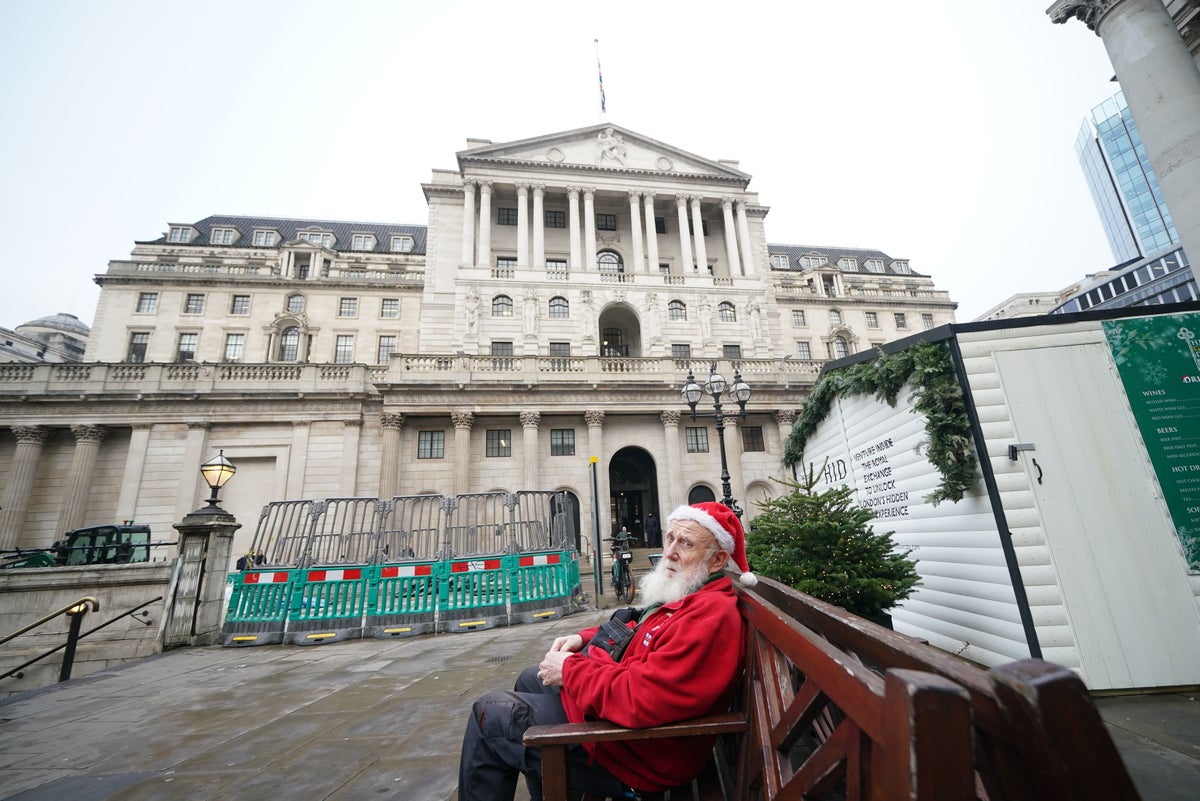
The Bank of England on Thursday held interest rates at a 15-year high as fresh data shone a spotlight on the UK’s frail economy.
The Monetary Policy Committee (MPC) met for the final time this year and decided to keep interest rates - which help dictate the mortgage rates set by High Street banks - at 5.25 per cent.
Interest rates have been hiked by the central bank in 14 consecutive meetings in an attempt to bring down soaring inflation by putting pressure on consumer spending.
However, it has now kept rates steady for a third consecutive time, despite inflation falling and concerns about Britain’s weak future prospects for economic growth.
Governor of the BoE, Andrew Bailey, said there was still more to be done in the battle to drag inflation further downwards and warned the policy will remain “restrictive for an extended period of time”.
He said: “We’ve come a long way this year, and successive rate increases have helped bring inflation down from over 10 per cent in January to 4.6 per cent in October, but there is still some way to go.
“We’ll continue to watch the data closely, and take the decisions necessary to get inflation all the way back to 2 per cent.”
The MPC voted six to three in favour of keeping interest rates unchanged, leaving them at their highest level for 15 years. It did not rule out further interest rate rises if there was evidence of “more persistent inflationary pressures.”
Governor of the BoE Andrew Bailey reiterated that that the target is the get inflation back down to 2 per cent
BoE staff added that economic growth is also likely to be broadly flat in the “coming quarters” as higher borrowing costs put pressure on consumer spending.
This is despite the growth measures announced in Jeremy Hunt’s Autumn Statement, which the BoE thinks will increase the level of GDP by only 0.25 per cent.
After the BoE’s decision the pound rose 0.8 per cent to 1.27 US dollars and was 0.3 per cent higher at 1.16 euros.
Rachel Reeves, Labour’s Shadow Chancellor of the Exchequer, responding to the interest rate decision, said: “Households across Britain have been left worse off after thirteen years of economic failure under the Conservatives.
“Working people are still paying the price from the Conservatives’ disastrous mini-budget that crashed the economy and sent interest rates soaring. This month alone more than 170,000 homeowners will be coming off fixed rate mortgages, typically having to pay an average of £240 more a month.”
A Treasury spokesperson said: “We have turned a corner in our fight against inflation and real wages are rising, but we must keep driving inflation out of the economy to reach our 2% target.”
Carsten Jung, senior IPPR economist, warned that the BoE’s decision on Thursday will mean it will take “even longer for the UK economy to emerge from its current almost zero growth.”
“It takes 18 months for the impact of high interest rates to feed into the economy, and two thirds of the pain from their current levels is yet to come. We face the risk of overkill – growth may be slowed further and longer than is needed, increasing the likelihood that inflation actually falls below the 2 per cent target.
“Even though inflation is coming down, that just means prices are increasing less fast – they are still much higher than before this crisis. Households on low incomes are still struggling with the cost of living, with 3.8 million people in destitution - including three times as many children as in 2017. Yet the cost-of-living support package for people on benefits has been withdrawn this year. We need to do more to help families cope with the very high prices they still face.”
It comes just a day after the gross domestic product (GDP) is thought to have fallen 0.3 per cent during October, down from 0.2 per cent growth in September, the Office for National Statistics (ONS) said.
The figures put further pressure on beleagured prime minister Rishi Sunak who had promised voters that growing the economy was one of his top priorities.
Paul Dales, chief UK economist at Capital Economics, told Reuters that the October data suggested that the UK could be in a recession.
“That may nudge the Bank of England a little closer to cutting interest rates, although when leaving rates at 5.25% tomorrow the Bank will probably push back against the idea of near-term rate cuts,” he said.
The BoE’s governor, Andrew Bailey, and other member of the MPC, had earlier warned that interest rates will remain where they are for the forseeable future amid continuing concerns about inflation.
At Parliament’s Treasury Committee last month, Mr Bailey suggested the threat of UK inflation is being underestimated and said the BoE is still focused on concerns over persistent inflation.
He said that inflation in the services sector, where most Britons spend their money, is likely to remain at around 6 per cent through the start of 2024.







